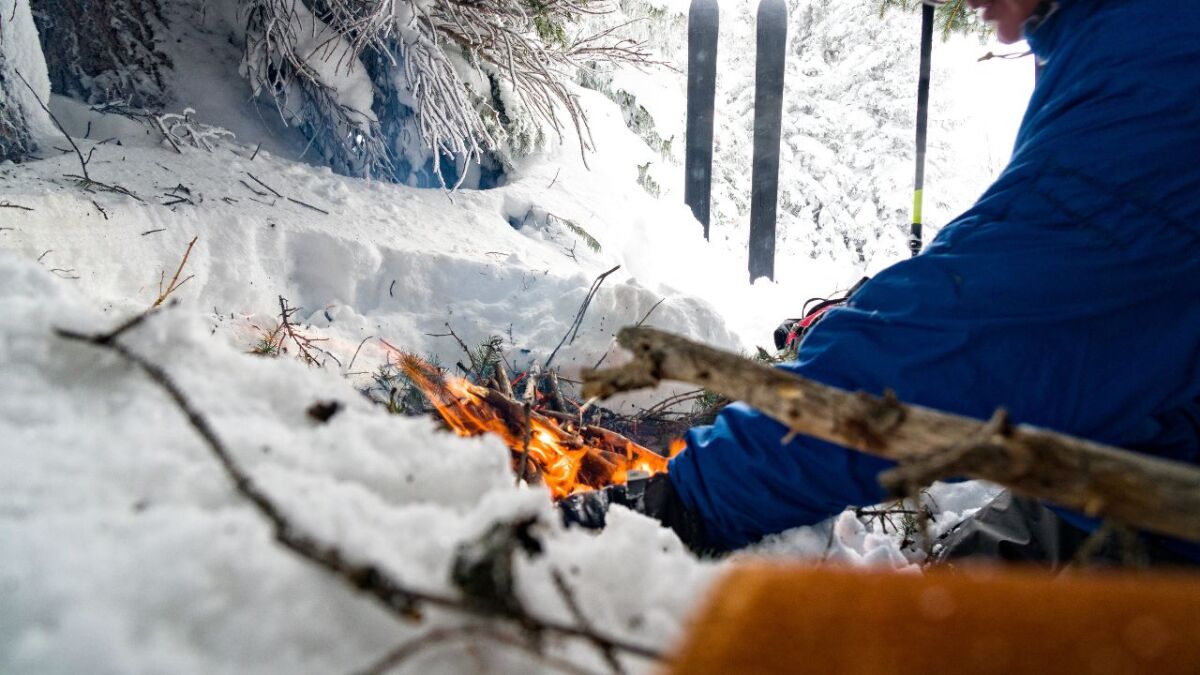
Survival techniques
Nomen
Meaning
Survival techniques are essential skills and strategies that enable individuals to survive and thrive in challenging outdoor environments. These techniques encompass a wide range of knowledge and abilities, including shelter building, fire making, foraging for food and water, navigation, first aid, and self-defense.
In the context of survival, bushcraft, wilderness, camping, and hiking, mastering survival techniques is crucial for anyone venturing into the great outdoors. These techniques provide the necessary tools to overcome unexpected situations, such as getting lost, encountering dangerous wildlife, or facing adverse weather conditions.
Survival techniques are not only practical but also empower individuals to connect with nature, develop self-reliance, and gain a deeper understanding of their surroundings. They are an integral part of outdoor education and play a significant role in promoting safety and resilience in the wilderness.

Examples
„I've been practicing survival techniques for years, and they have saved my life more than once.“
„When you're out in the wilderness, knowing basic survival techniques can make all the difference.“
„My friend and I were discussing different survival techniques, and he mentioned the importance of finding clean water sources.“
„During my last camping trip, I had to rely on my survival techniques to start a fire in the pouring rain.“
„Learning survival techniques is not just about being prepared for emergencies, it's also about connecting with nature and gaining self-confidence.“
Origin
The word "Survival techniques" originates from the Latin word "survivere", which means "to live beyond". The concept of survival has been a fundamental part of human existence since the beginning of time. It has its roots in our primal instinct to adapt and overcome challenges in order to ensure our survival.
Survival techniques have evolved over centuries, shaped by the experiences and knowledge of different cultures and civilizations. From ancient hunting and gathering methods to modern-day wilderness survival skills, the development of survival techniques has been influenced by factors such as geography, climate, and available resources.
In recent history, the term "survival techniques" has gained popularity due to the increased interest in outdoor activities, adventure sports, and emergency preparedness. It encompasses a wide range of skills and knowledge, including shelter building, fire making, foraging, navigation, first aid, and self-defense.
Today, survival techniques are not only practiced by outdoor enthusiasts and adventurers but also taught in specialized training programs and utilized by military personnel, emergency responders, and disaster relief organizations. The evolution of survival techniques continues as new technologies and innovations are incorporated into traditional practices, ensuring our ability to thrive in challenging and unpredictable situations.
Synonyms
Survival skills, Wilderness survival, Bushcraft, Outdoor survival, Primitive skills, Naturecraft, Survival tactics, Survival methods
Antonyms
Urban living, Dependence, Vulnerability, Ignorance, Helplessness, Fragility, Reliance, Surrender
Relatives
Wilderness survival, Bushcraft skills, Outdoor survival, Primitive skills, Survival training, Survival skills, Emergency preparedness, Survival tips
Historical and cultural importance
Survival techniques have a rich historical and cultural significance that spans across different civilizations and time periods. Throughout history, humans have relied on their ability to adapt and survive in challenging environments, and the techniques developed over centuries have shaped our understanding of survival today.
One of the earliest examples of survival techniques can be traced back to ancient civilizations such as the Egyptians, Greeks, and Romans. These cultures developed various skills and knowledge to navigate and survive in harsh desert landscapes, including finding water sources, building shelters, and identifying edible plants.
In more recent history, survival techniques gained prominence during times of war and exploration. Soldiers and explorers had to learn how to survive in unfamiliar and hostile environments, often relying on their resourcefulness and ingenuity. Techniques such as building fires, constructing makeshift shelters, and foraging for food became essential skills for survival.
Survival techniques also have cultural significance in indigenous communities around the world. Native tribes have passed down their knowledge and skills from generation to generation, teaching their members how to live off the land and adapt to their surroundings. These techniques often involve a deep understanding of nature, including tracking animals, identifying medicinal plants, and using traditional tools and methods.
Today, survival techniques continue to evolve and adapt to modern challenges. With the rise of outdoor activities and interest in self-sufficiency, many people are learning these skills as a way to reconnect with nature and prepare for emergencies. From wilderness survival courses to online resources, there are numerous opportunities to learn and practice survival techniques in the present day.
More information about the term Survival techniques
Survival Techniques
Survival techniques are essential skills that enable you to survive and thrive in challenging and potentially life-threatening situations. Whether you find yourself lost in the wilderness, stranded in a remote location, or facing a natural disaster, knowing and practicing survival techniques can make all the difference in your ability to stay safe and overcome adversity.
Shelter Building
One of the most crucial survival techniques is the ability to build a shelter. In extreme weather conditions, having a shelter can protect you from the elements and help maintain your body temperature. You can construct a shelter using natural materials such as branches, leaves, and debris, or by utilizing a tarp or emergency blanket. Understanding different shelter designs and knowing how to adapt them to your surroundings is essential for survival.
Fire Starting
Fire is not only a source of warmth but also provides light, a means of cooking food, and a way to signal for help. Knowing how to start a fire using various methods, such as friction-based techniques like the bow drill or using a fire starter kit, is a vital survival skill. Additionally, understanding how to gather and prepare tinder, kindling, and fuel will increase your chances of successfully starting and maintaining a fire.
Water Sourcing and Purification
Access to clean drinking water is crucial for survival. Knowing how to find and collect water from natural sources such as rivers, streams, and rainwater is essential. However, water from these sources may contain harmful bacteria and parasites. Therefore, learning different water purification methods, such as boiling, using water filters, or chemical treatments, is necessary to ensure the water you consume is safe.
Food Procurement
When faced with a survival situation, finding food becomes a top priority. Understanding various methods of procuring food, such as foraging for edible plants, fishing, trapping, and hunting, can help sustain you in the wild. Learning about local flora and fauna, identifying edible plants, and acquiring basic hunting and fishing skills are essential for successful food procurement.
Navigation and Signaling
Being able to navigate your surroundings and communicate for help is crucial in a survival situation. Learning how to use a compass, read maps, and understand natural signs can help you find your way to safety. Additionally, knowing how to signal for help using visual cues, such as smoke signals or reflective surfaces, and auditory signals, such as whistles or shouting, can increase your chances of being rescued.
First Aid and Medical Skills
Injuries and illnesses can occur during a survival situation, making first aid and medical skills essential. Knowing how to treat common injuries, such as cuts, burns, sprains, and fractures, can prevent further complications. Additionally, understanding basic medical procedures, such as CPR and wound care, can save lives in critical situations. Having a well-stocked first aid kit and knowing how to use its contents is also crucial.
Survival techniques are not only about physical skills but also about mental resilience and adaptability. Maintaining a positive mindset, staying calm under pressure, and being resourceful are all vital aspects of survival. Regular practice, training, and gaining knowledge through books, courses, or experienced mentors can help you develop and refine your survival techniques, ensuring you are prepared for any challenging situation that may arise.
Back to overview

